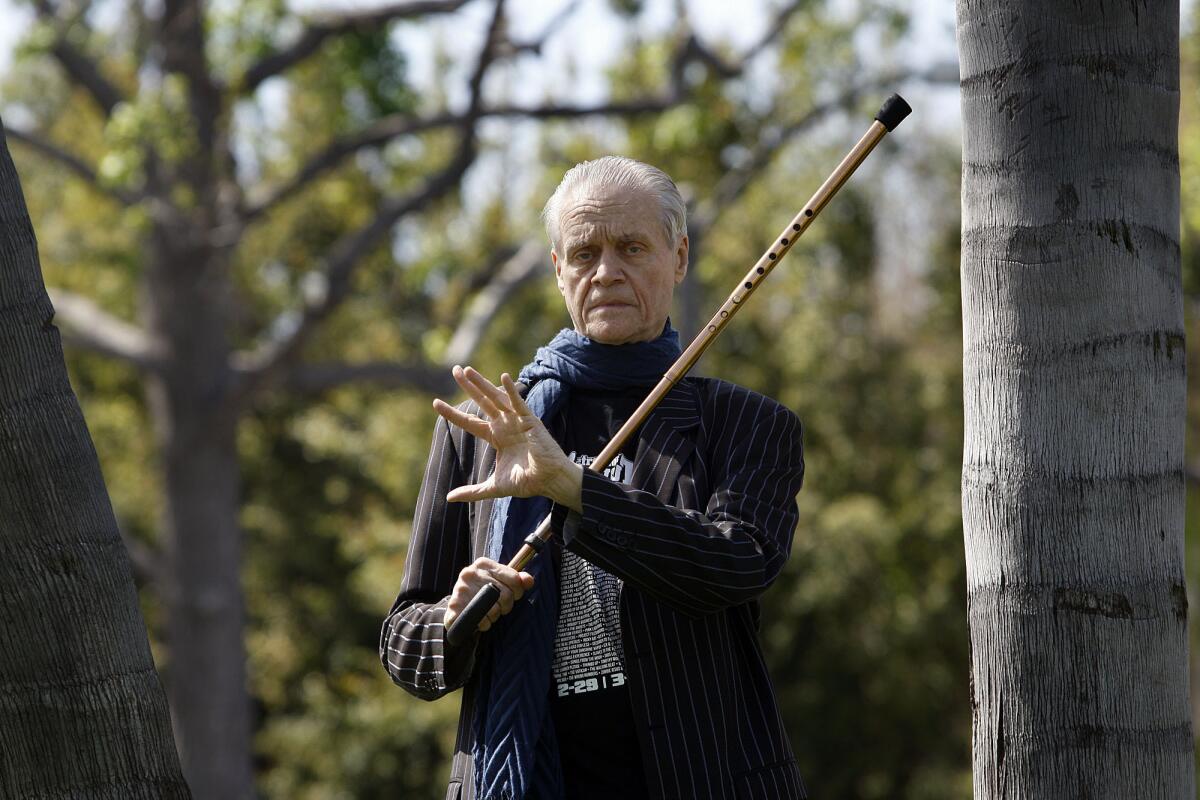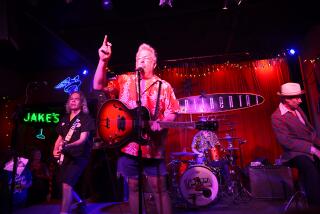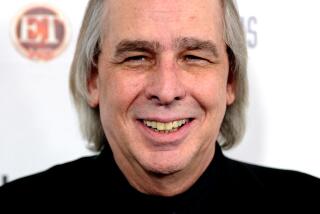Appreciation: Friends, colleagues, fans recall Kim Fowley as brash but loving

Few citizens cut a wider swath across rock ‘n’ roll Los Angeles than Kim Fowley, who died Thursday at age 75 after a long battle with cancer. The longtime music fixture ran wild through the city starting in the late 1950s, and in that time made friends and enemies alike.
After Fowley’s passing, The Times ran two pieces on him: one, a typically comprehensive obituary written by Randy Lewis, which gathered life highlights and put his work in context; and an appreciation, written by me, which attempted to celebrate Fowley while acknowledging some of his more public shortcomings.
Readers lined up to criticize my take, and in hindsight I can understand why. The appreciation tilted away from a celebration of his life, and lacked ample information on the many ways in which Fowley was a force of good in the Los Angeles music scene.
What follows are excerpts of messages from a number of Fowley admirers -- employees, friends, musicians, fans -- whose experiences with the mercurial music man shine a brighter light on a Los Angeles original:
Drummer Danny Benair is best known for his work with 1980s psychedelic pop band the Three O’Clock and his regular Danny Benair’s Record Club fetes at Freakbeat Records. He also runs the respected music licensing company Natural Energy Lab.
“I went to Kim Fowley High School,” writes Benair of his early education under the tutelage of Fowley, who “did the hustle” for the drummer’s first band, the Quick, in the late 1970s.
Using all-caps to drive the point home, Benair wrote: “THERE WAS NO SCENE MAN!! Kim created one. He had us playing hair salons, Jewish Temples and pulled off a crazy one filling the Starwood with so many people that started something ... that landed us a record deal. We got to record at the Beach Boys’ studio Brother for a month with Earle Mankey, in our case not a few-dollars-an-hour joint.”
Continued Benair: “He managed, co-produced us and [then] took his eye off the ball. But he was epic and that was Kim. I told him many times what he meant to me. Last time we talked about five months ago, he asked what was going on, made notes, primed his Rolodex at the ready for his next call. He said we may never talk again. I said don’t say that but I sort of thought he was right.
He lent me his awesome box of 45s after Kim Fowley day at Rhino Records store and I recorded every one. He gave me an acetate “Jack in the Box” by Swedish pop psych band the Jackpots [because] he knew I dug it.”
*
Chris Darrow has been an integral part of the Los Angeles music scene since the early 1960s. Among the 350-plus records he had a hand in are works by Kaleidoscope, Linda Ronstadt, Nitty Gritty Dirt Band, Leonard Cohen, James Taylor and a string of acclaimed solo albums. Darrow knew Fowley for 45 years.
“There are two sides to every coin and Kim Fowley had many sides,” writes Darrow. “The public figure was a persona that got him where he wanted to go and what he wanted to get. The man behind the persona was a nice, caring guy who helped out a lot of people ...
“He’s the only guy I ever knew in the music business who was on the job 24 hours a day, seven days a week. He made a lot of money but never spent it on himself. No house, no car, no 401Ks, and lived in little apartments, etc. He invested all his money into his projects and used it for studio time and paying musicians. He also employed a number of people to help with his work.”
Darrow continued: “Show business is a hideous thing to be involved in and Kim chose his own way to deal with it. Kim was always fair and helped out many people who were looking for a place to fit in.”
Then the musician offered his official statement: “I have known Kim Fowley since the 1960s and we have been good friends ever since. He always called me his big brother, even though he was older than me, and we had many heartfelt talks on the phone in the early mornings. He always said, ‘You are the only other guy I know who is up until 3 or 4 a.m. that I can call.’ He was supremely intelligent and a rock and roll scholar of the highest order. I will miss him greatly.”
*
Gary Stewart was one of the first employees of Rhino Entertainment, and served at Rhino’s senior vice president of A&R. At his site Trunkworthy, Stewart wrote: “While many only know (and narrowcast) him for his abrasiveness and colorful bravado (which, let’s face it, comes with the turf of rock ’n’ roll), I was lucky enough to experience his intellect and insanely encyclopedic knowledge of rock ’n’ roll history, including a late-night drive around Washington, D.C., where he challenged a car full of people to name any city in the U.S.A., and followed by citing the myriad greats and notable cult figures that musically or biologically sprung from each.”
*
Sandy Robertson, a former editor at the British music/fashion magazine Sounds: “I read your piece on Kim Fowley. While it contains some truth, like all the obituaries I’ve read in the mainstream press it had a rather uninformed and narrow focus.
“Kim did so much more than novelty records or hustling, having lived all over the globe and helped hundreds of artists, and even while battling cancer he won an award for innovation at the Melbourne Underground Film Festival.
“When I was a rock journalist in the UK my colleagues regarded my love of Kim as an aberration. Yet real creators, such as members of bands like Blondie and Bruce Springsteen’s band, are lining up to pay tribute to his genius. I saw him perform in a London club and hold an audience spellbound with a totally improvised set.”
*
Aime Elkins-McCrory was Fowley’s assistant from 1989-1994. She penned a lengthy remembrance that captured the many sides of Fowley.
“What saddens me most about Kim’s passing,” she writes, “was that many took his verbal abuse and larger-than-life personality to heart instead of seeing the raw wisdom, passion and life experience [he] had to offer.
“Kim never intended to hurt anybody. He was always trying to survive (or hustle as he called it) while creating meaning in his life, and in the lives of others he came into contact with. For example, he knew at the time I wanted to be a filmmaker, so Kim had me videotape everything, he hired me to take photographs for three of his albums. Whether it was with a band or with a person, Kim was always striving to cultivate raw talent in the bands and people that he believed in ...
“When Kim did yell at me, he often prefaced it by saying ‘Hate me, but learn from my mistakes, and you’ll go a long way.’ And looking back I did.”
McCrory stressed that his abrasive demeanor was often misinterpreted. “As usual the delivery was crass and as usual, he was right in what he was saying. People just don’t like directness, or having someone crassly point out their flaws. Kim didn’t do this to be cruel; he was like a drill sergeant using tough love to make the people he believed in stronger.
”... [T]o me was a lot better than having a polished, politically-correct boss, [who] then eventually throws you under the bus because he/she is threatened of your greatness. Kim was never threatened by anyone’s greatness and truly wanted to extract the greatness in everyone he met. Some may say he tried to capitalize on every opportunity, but don’t we all in some way or another? It’s just that most of us are less obvious about it, and more politically correct in our language and mode of operation.”
*
Writer Daniel Weizmann: “Your obit of the late, great Kim Fowley made some interesting points but, as an LA hero, he deserves deeper, more serious consideration from his hometown paper. His real bio reads like a history of the blossoming of SoCal culture -- the son of one of the actors in ‘Singing in the Rain,’ who went on to work for Doris Day, and vanguarded the psychedelic Sixties in our city, then single-handedly birthed the west coast punk scene, and still had a viable career shaping pop culture half a century later.
“If he were merely a hustler and a carpetbagger like so many others who pass through these parts, we wouldn’t be talking about him at all. He was, in fact, something more: a rare larger-than-life character that helped LA find its own voice.”
*
And, finally, David Kessel didn’t pull any punches in his response to my appreciation: “How dare you think you know anything about Kim Fowley. You’re a fraud. I have worked with Kim, he was a friend. In a town of [excrement], you dare to degrade a hard working show biz guy. Who the hell authorized you to know anything about anything? I grew up in this business, and you are the kind of [excrement] that we all laugh at for being such a know-nothing.”
Fowley couldn’t have said it better himself.
Follow Randall Roberts on Twitter: @liledit
More to Read
The biggest entertainment stories
Get our big stories about Hollywood, film, television, music, arts, culture and more right in your inbox as soon as they publish.
You may occasionally receive promotional content from the Los Angeles Times.







